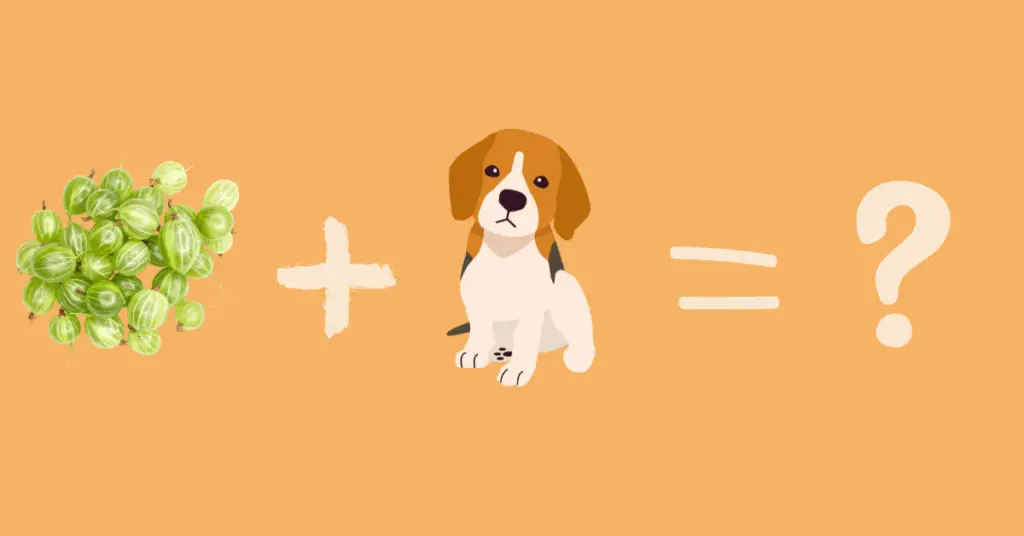
When it comes to feeding our beloved furry friends, we must always be cautious about what we offer them. The question often arises: Can dogs eat gooseberries? However, it’s essential to understand that while gooseberries might seem like a healthy choice for humans, they are not suitable for our canine companions. Here, we’ll delve into the reasons why gooseberries should not be a part of a dog’s diet and the risks associated with offering this fruit to your dog.
Understanding Gooseberries
Gooseberries, scientifically known as Ribes uva-crispa, are small, round berries. They come in various colors, including green, red, yellow, and even purple. Their distinctive tart and slightly sweet flavor make them a popular choice for jams and pies. Packed with essential vitamins, minerals, and antioxidants, they offer health benefits to humans.
Nutritional breakdown of gooseberries
Examining the nutritional breakdown of gooseberries naturally leads to the question: can dogs eat gooseberries? This inquiry arises as we uncover concerning aspects of their composition, prompting doubts about their suitability for a healthy diet. Understanding the specifics of gooseberries’ nutritional components, encompassing potential drawbacks such as sugars or other elements, naturally leads us to critically assess their value as a nutritious option for our furry friends. Let’s scrutinize the intricate nutritional profile of gooseberries, considering the aspects that might not align with a dietary regimen focused on optimal health.
| Nutritional Components | Gooseberries |
| Vitamin C | High levels |
| Vitamin A | Present |
| Potassium | Moderate |
| Dietary Fiber | Rich |
| Natural Sugars | Present |
Can your dogs eat gooseberries?
Now we can answer the main question “Can dogs eat gooseberries?” While dogs can consume a variety of fruits and vegetables, gooseberries should be approached with caution. The answer to “can dogs eat gooseberries” is NO. Gooseberries can pose risks to a dog’s health, primarily due to their small size and potential choking hazard. Dogs might not chew these berries adequately, leading to an obstruction in their throat.
Moreover, gooseberries contain natural sugars that can cause a rapid spike in blood sugar levels, which is not ideal for a dog’s metabolism. Additionally, there’s a possibility of allergic reactions, ranging from mild itching to severe responses. Considering these factors, it’s advisable to consult your veterinarian before offering gooseberries to your furry friend, ensuring their safety and well-being is a top priority.
Why Are Gooseberries Not Suitable for Dogs?
Naturally, the question often arises: can dogs eat gooseberries? While gooseberries might seem like a tempting treat due to their vibrant appearance and appealing taste, they are not suitable for dogs. It’s essential to understand the reasons behind their unsuitability in a dog’s diet.
1. Digestive Upset
One of the primary reasons dogs should not consume gooseberries is the potential for digestive upset. The digestive systems of dogs and humans are different, and certain fruits that are safe for us can cause gastrointestinal issues in dogs. Gooseberries may lead to diarrhea, stomach cramps, or other digestive discomfort in our canine companions.
2. Risk of Choking
Gooseberries have small seeds and can be a choking hazard for dogs. If a dog ingests a gooseberry whole or doesn’t chew it properly, it can get stuck in their throat, leading to choking. This risk is a significant concern and a strong reason to avoid offering gooseberries to dogs.
3. Spike in Blood Sugar
Gooseberries contain natural sugars, and while these sugars might not be harmful to humans in moderation, they can cause a rapid spike in blood sugar levels in dogs. This sudden increase in blood sugar is not healthy for dogs, particularly for those with diabetes or insulin sensitivity.
4. Potential Allergic Reactions
Just like with any food, dogs can develop allergies to gooseberries. Allergic reactions can manifest as itching, rashes, hives, or even more severe symptoms. As responsible pet owners, it’s crucial to avoid potential allergens and monitor our dogs for any adverse reactions.
Dog-Friendly Fruit Options (Safer Alternatives to Gooseberries)
Naturally, the query “can dogs eat gooseberries?” arises in the minds of cautious pet owners seeking safe fruit options for their beloved canine companions. It’s essential to find fruits akin to gooseberries in terms of being generally safe and well-tolerated by dogs. When we talk about safe fruits for dogs, we’re looking for alternatives that offer similar safety and ease of digestion, ensuring our furry friends can enjoy a tasty treat without any adverse effects. Let’s explore a variety of fruit options that share these desirable characteristics, providing a safe indulgence for our canine pals.

Blueberries:
Blueberries are small, nutrient-dense fruits packed with vitamins and antioxidants. They are safe for dogs and can be a tasty and healthy treat.
Strawberries:
Strawberries are another safe option for dogs. They provide essential vitamins and fiber, promoting good digestion and overall health.
Raspberries:
Raspberries are low in calories and high in fiber. They can be given to dogs in moderation and are a good source of vitamins and minerals.
Blackberries:
Blackberries are rich in vitamins and antioxidants, making them a nutritious choice for dogs. However, like other fruits, they should be given in moderation.
Always remember to wash the fruits thoroughly, remove any pits, seeds, or inedible parts, and introduce them in moderation to observe how your dog’s digestive system reacts. If you’re introducing a new fruit to your dog’s diet, it’s a good practice to consult your veterinarian for advice on portions and suitability for your specific dog.
Related FAQ
The Bottom Line: Gooseberries and Your Dog
In conclusion, considering the potential digestive upset, choking hazard, blood sugar spikes, and allergic reactions, it’s advisable to steer clear of feeding gooseberries to dogs. While we might enjoy this fruit, it’s in the best interest of our canine companions to focus on safe and dog-friendly treats. Always consult your veterinarian for accurate advice on what’s appropriate and safe to include in your dog’s diet.
Remember, our dogs rely on us to provide them with a balanced and suitable diet. Opt for treats and snacks that are known to be safe for dogs, ensuring their health and well-being are a top priority.
Can Dogs Eat Gooseberries? The Lowdown on a Dog’s Diet. It’s clear that while gooseberries are suitable for humans, they should not be a part of our dog’s diet due to potential health risks. It’s always better to be safe than sorry, especially when it concerns our furry family members. Be cautious and informed when choosing what to feed your dog, prioritizing their health and happiness.

Really excellent information can be found on site.Blog money
Thank you for your sharing. I am worried that I lack creative ideas. It is your article that makes me full of hope. Thank you. But, I have a question, can you help me?